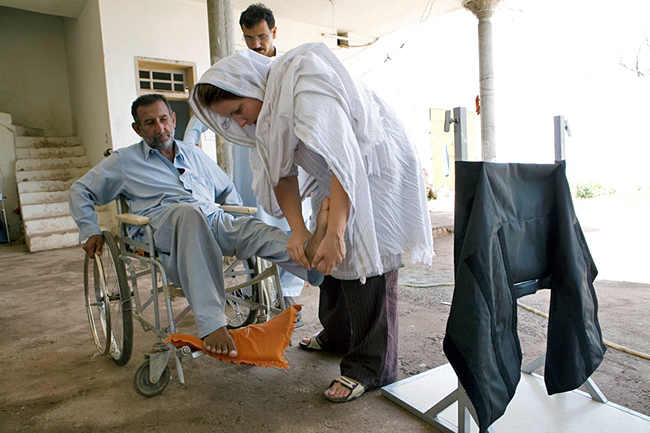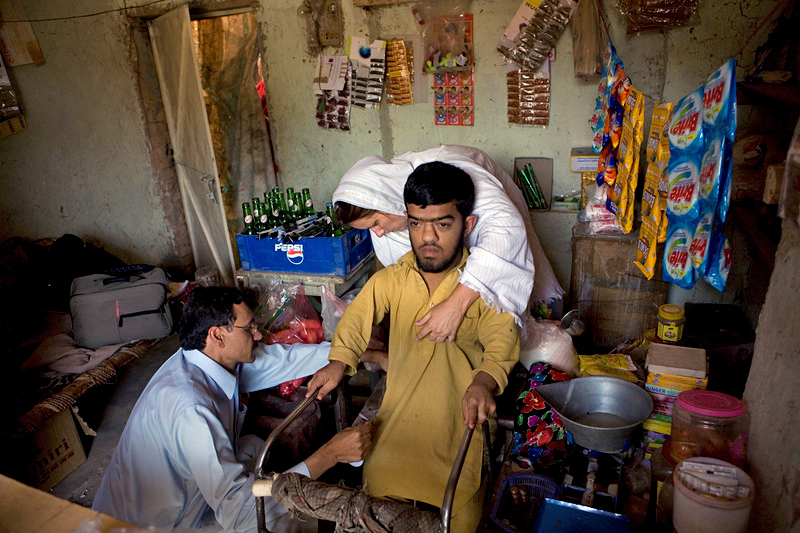Like many young Otago graduates, physiotherapist Sara Drum left her home country in 1998 and set out for the brighter lights of London.
She had no way of knowing the kind of challenges and rewards her career in physiotherapy would offer.
Two decades later she tells us about some of her work in the world's most demanding locations.
ICRC helps victims of conflict
The International Committee for the Red Cross is a Swiss-based humanitarian organisation that provides protection and help for victims of armed conflict and other situations of violence. Sara visited their Museum in Geneva on her travels and read about the role of physiotherapy in providing such protection and help. This visit left a deep impression.
Soon after, she spotted an advertisement for a role with the organisation and applied immediately. Sara was to embark on a career of almost infinite variety which at times involved a real element of risk.
In countries such as Pakistan, North Korea, Iraq and Afghanistan, ICRC physiotherapists team up with local partners to ensure that their work is viable and sustainable. Sara recalls the rehabilitation of a patient in Peshawar Pakistan who had suffered a spinal cord injury, and she reflects on the ongoing efforts of her Iraqi colleagues to bring dignity back into the lives of the people of the city of Mosul in Iraq after the precipitative interventions of 2003.

Often a patient has trouble sitting in a wheelchair or even standing unassisted. Here Sara is reviewing a patient's lower limb range of motion, prior to his attempting to stand in the walking frame. The photograph was taken at the ICRC Spinal Cord Injury Home Care unit, Peshawar, Pakistan. 2007, Courtesy of Sara Drum.
Current Red Cross engagement in Mosul follows the retaking of the area by the Iraqi army from Islamic State who had controlled the area since 2014.
Iraq offered Sara her first management position. She soon found that while physiotherapy was long established and supported by robust systems, years of instability and conflict meant that many essential resources were no longer available to government organisations.
A world of contrasts
The scope of work that ICRC physiotherapists perform ranges from being part of an intensive care team to the treatment of long-term disability.
Resourcing can be a critical issue, and it helps to be able to have some ability to problem solve with what is available.
While the ICRC applies established international standards and systems to provide prosthetics and orthotics and the best possible quality of service for every disabled patient the cost of a prosthetic limb or other assistance devices can be prohibitive and there are times when local expertise is sought for the fashioning and fitting of such devices.
A physio working in the field must be resourceful, adept, flexible and collaborative if their work is to succeed. New Zealand is now a multiracial society, and Sara believes that physios trained here may be better prepared for complex situations which demand cultural sensitivity and collegiality.

Sara Drum and an assistant from the Peshawar Workplace Assessment team are assessing a patient for the right size chair, which will give him the necessary support in sitting. After receiving orthoses, a walking frame, and some training on how to mobilize, this patient opened a small shop.2009, Courtesy of Sara Drum.
Strong assessment skills essential
Sara's training at Otago had prepared her well with skills in clinical reasoning and critical thinking, but she found herself challenged by patients presenting with conditions and injuries well beyond the scope of her New Zealand experience.
She feels that her New Zealand training helped to make accurate assessment easier. While the work could be grueling at times, Sara's pragmatic approach and simple willingness to get up each morning and set to work regardless of almost all circumstances made life easier for the teams.
Red Cross physiotherapists work from a pool of available professionals on rotation, with most contracts being for one year. Unlike local team members, ICRC staffers like Sara are able to leave at the end of their contracts. If the work is particularly challenging, regular out of country rest and recreation breaks are mandatory.
Otago trained physiotherapists are at work today in many parts of the world, helping to empower those with health conditions to be more active in their communities.
Sara Drum has recently returned to New Zealand bringing with her unique insights and deep experience which will strengthen and help grow the profession of physiotherapy in this country.
Sara Drum graduated from the School of Physiotherapy at Otago in 1996 with a Bachelor of Physiotherapy (BPhty)
Read about the work of the ICRC or International Committee of the Red Cross
Publications
Lawrence, R. (2005). Branding terroir in the ′New World′: Modes of representation in the wine industry. In P. Sorrell, C. Ozcan, E. Kocabiyik & Z. T. Ultav (Eds.), Proceedings of the IST Product and Service Design Symposium and Exhibition on Agricultural Industries. Izmir, Turkey: Izmir University of Economics. [Full Paper] Conference Contribution - Published proceedings: Full paper